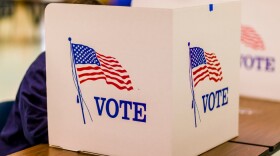The November election brought mixed results when it came to local school levies. Renewals passed easily, but some additional levies faced bigger challenges. At least one district is crossing its fingers that its razor thin margin holds while absentee ballots trickle in. Morning Edition Host Amy Eddings spoke with ideastream’s education reporter Jenny Hamel.
So, how would you characterize what you’re seeing this November?
I think getting school districts in Ohio to convince the public to raise taxes on themselves to fund schools, that is a tough, tough business. Especially with a pandemic and people struggling financially, very few districts are getting levies passed by huge margins and, if anything, the issue of levies seems to divide voters pretty evenly.
Let’s take Cleveland Heights-University Heights. Their levy failed in the spring with a strong opposition effort from a group called Tiger Nation 4 Lower Taxes. District officials have since then said they’ve been hit really hard by school choice vouchers known as EdChoice and they’ve vowed to reduce spending. So after Tuesday, the unofficial count shows that the CH-UH 4.8-mill levy is ahead by a mere 65 votes.
The Cleveland Metropolitan School District pulled out an easier win with Issue 68. You spoke to CEO Eric Gordon. What did he have to say?
Gordon was extremely grateful. He says it’s testament to how much people in Cleveland care about their students. Sixty-one percent of voters supported a 15-mill levy renewal and a 5 mill increase. Even though CMSD did face opposition from a pretty secretive group called Cleveland’s Future Fund. They said the levy would cause rents to go up and other things. Gordon says their secretiveness and messaging actually worked against them.
“Candidly, I think the opposition took a really bad strategy of trying to threaten and frighten and bully Clevelanders,” Gordon said. “That's not our style. We don't like that.”
But at the same time Gordon made very clear that if the levy didn’t pass, it would leave a $65 million hole in their operating budget, which would have meant the closure of dozens of schools and a $10 million reduction in staff.
So let’s take a look at Euclid. Voters there finally passed a levy for the city school district after they rejected it three previous times.
They are very excited. This November’s 8.7-mill levy is expected to bring about $5.5 million to the district.
That’s great news for Euclid but what about the school districts that saw levy failures? What about Parma?
I had a conversation before the election with the Parma Superintendent Charles Smialek about their construction levy. They needed the funding to start their strategic plan of consolidating and building new 6th through 12th grade schools, in an effort, as he says, to right-size the district. But ultimately, Issue 73 failed 54 to 45 percent.
After the proposal failed Tuesday, Smialek told me he thinks there might be a general distrust towards the district and how it spends money because of decades-old financial mismanagement.
“It seems that there is a cloud that still sort of hangs over the district when we go to ask for new money,” Smialek said. “And that's frustrating from the standpoint that those are past boards, those are past superintendents, those are past treasurers. And we have turned that page.”
This go-around he’s going to do a ward by ward analysis to see which voters still need swaying for the next time the levy hits the ballot.
Do you think the fact that we’re in the middle of an ongoing coronavirus pandemic may have actually helped some of these districts get their levies passed?
I think there is a point to that. I definitely think that parents and the community have been made more aware of the haves and the have nots when it comes to school districts. And you’ve got these urban districts with poorer kids or students who don’t have as many resources scrambling to get more Chromebooks and to get hotspots for kids who don’t have internet. So there might have been kind of a more empathetic turn where you’ve got voters and community members saying, “Hey, the school district might actually really need the funding that is being proposed through this levy.”


![Absentee ballots still arriving at the Cuyahoga County Board of Elections could impact the slim lead in support of a levy for the Cleveland Heights-University Heights school district. [Annie Wu / ideastream]](https://npr.brightspotcdn.com/dims4/default/d4c074f/2147483647/strip/true/crop/3000x1688+0+0/resize/880x495!/quality/90/?url=http%3A%2F%2Fnpr-brightspot.s3.amazonaws.com%2Flegacy%2Fuploads%2F2020%2F11%2F05%2FHeights%20High%202.jpg)

